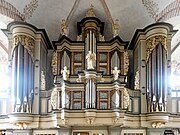Berendt Hus
This article needs additional citations for verification. (December 2019) |
Berendt Hus (also Huß or Huss; c. 1630 – February 1676) was a German organ builder.
Life and work
[edit]Hus was born around 1630[1] in the Oldenburg area of northern Germany. The earliest record of his activity comes from 1650 when he assisted his master teacher Hermann Kröger in building a two-manual instrument in Langwarden.[2] Shortly after the completion of the organ in Celle, where he worked in 1653 as a journeyman under Kröger on the organ's prospect, Hus became an independent organ builder. In 1654, Hus married Maria Fritzschen in Oldenburg and obtained citizenship rights in the city. Baptisms of four children were recorded between 1656 and 1671. His first independent project was a new organ built in Diepholz between 1655 and 1656.
Hus is best known as a relative and master teacher of the organ builder Arp Schnitger, who apprenticed with Hus between 1666 and 1671 and thereafter worked for him as a journeyman until Hus's death in 1676.[3] Their most significant collaboration was a new organ in the Church of St. Cosmas and Damian in Stade built between 1668 and 1673.
The Kröger/Hus organ in Langwarden has been largely preserved in its original disposition (14 out of 21 stops).
All in all, Berendt Hus built five new organs and rebuilt or repaired several others.[3]
Currently known works
[edit]| year | town | church | picture | manuals | stops | notes |
|---|---|---|---|---|---|---|
| 1650 | Langwarden | St. Laurentius |  |
II/P | 21 | collaboration with Hermann Kröger; organ largely preserved |
| 1653 | Celle | Stadtkirche St. Marien |  |
III/P | 35 | collaborated on the prospect, which is preserved; pipes reconstructed by Rowan West (presently III/P/49) |
| 1655–1656 | Diepholz | Stadtkirche | II/P | 16 | ||
| 1658–1659 | Mariendrebber | St. Marien und Pankratius | II/p | 17 | enlarged in 1857 by Bros. Haupt with the addition of a pedal division (II/P/22) | |
| 1658–1660 | Eckwarden | St. Lamberti | II/p | |||
| 1661–1665 | Glückstadt | Stadtkirche Glückstadt | 
|
II/P | 27 | enlarged by Hus and Schnitger with the addition of a new division (Brustwerk) in 1674–1675; prospect preserved, now in St. Nicholas (Burg auf Fehmarn) (picture) |
| 1667 | Jade | Trinitatiskirche |  |
I/p | 11 | attribution[2] |
| 1668–1673 | Stade | St. Cosmae et Damiani (Stade) |  |
III/P | 42 | completed by Arp Schnitger; largely preserved |
| 1673 | Sandstedt | Ev.-luth. Kirche |  |
II/P | 16 | prospect preserved; pipework by Bros. Hillebrand and Alfred Führer |
| 1673–1676 | Stade | St. Wilhadi | III/P | 45 | completed by Arp Schnitger; destroyed by fire in 1724 |
References
[edit]- ^ Arp Schnitger. Vol. 14. Bärenreiter. 2005.
- ^ a b Schild, Fritz (2005). Denkmal-Orgeln : Dokumentation der Restaurierung durch Orgelbau Führer 1974-1991. Vogel, Harald. Wilhelmshaven: F. Noetzel. pp. 589–90. ISBN 3795908620. OCLC 65207795.
- ^ a b Fock, Gustav (1974). Arp Schnitger und seine Schule; ein Beitrag zur Geschichte des Orgelbaues im Nord- und Ostseeküstengebiet. Kassel: Bärenreiter. p. 18. ISBN 3761802617. OCLC 1043813.
